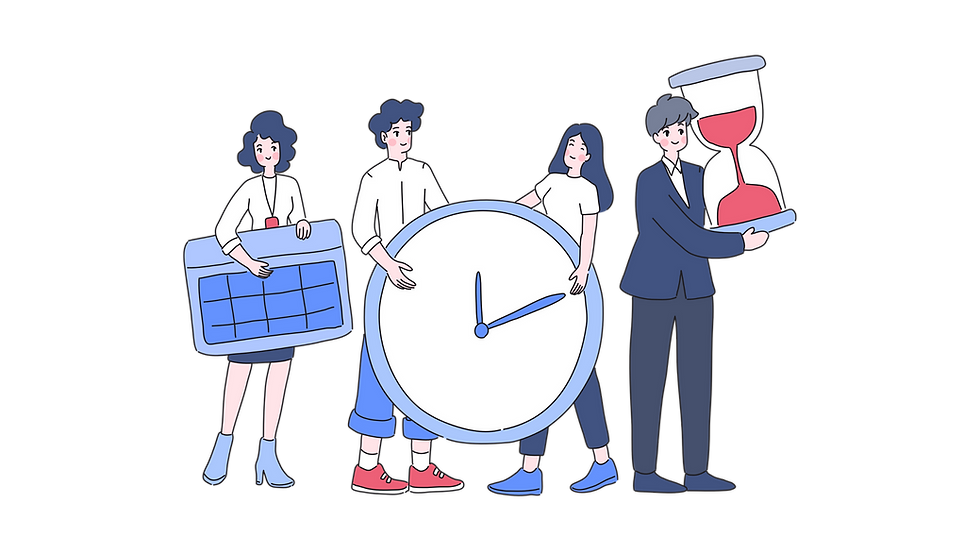Stop your team saying, ‘I Don’t Have Time’

It's impossible to create more time for employees or anyone else, but it's possible to make better use of it by helping the team to manage their time better.
Poor time management skills can result in missed deadlines, dissatisfied clients, increased costs and employees are most likely overworked, stressed, and on the road to burnout.
We're bringing up a number of time management useful techniques to implement.
Time management issues the employees face:
Not knowing what work to prioritize
Having trouble saying no even when their workload is full
Feeling overwhelmed with too many tasks
Procrastinating or not finishing what they start because timelines aren’t clearly set
Always being in reactive mode due to an unclear strategy
Help employees discover where their time is going.
Ask your team to write down their agenda for the current week about how they spend their time.
Once you have information, sit down with each team member and ask questions:
• How well is your time aligned with the work that matters most to you?
• What gets in the way of spending time on your priorities?
• What tasks took more time than you thought they would?
• Which ones took less time than you anticipated?
• How do you use time gaps between activities?
This conversation will help you understand how to support your team on time management. Maybe they simply have too many tasks to do on them and need to delegate. Or maybe they’re unable to spend time on their most meaningful work due to constant interruptions by peers or urgent problem-solving meetings.
Teach your team to plan and estimate their time better
First, you identify where their actions are going in relation to goals, and then make an adjustment.
No matter how good the time for an activity is planned, it’s in most cases going to take a bit longer time than expected.
I’m sure you’ve fallen into this trap yourself. However, it’s even worse for your team members who have the added pressure to not fail or disappoint you.
Help them spend the time they have more wisely.
Start by being more active in the planning process or deliverables. As a leader, you have better insight into certain things they don’t.
Prioritize.
Help employees evaluate their responsibilities based on importance and urgency and encourage them to complete tasks with the highest priority first. This process requires effective open-communication between employees and executives to ensure that priorities are properly aligned with department and company goals.
Prioritization is also extremely important for company Executives. When you have for instance too many good ideas and you don't set priority, you end up jumping from one to the other ineffectively unless you prioritize them.
If working on tasks, rank each item by its importance - or deadline - and start working down the list. If anything unexpected comes up during the day, you can feel better knowing that the most time-sensitive tasks have already been addressed.
Organize.
Every minute lost because of chaos in the workplace. Figuring out misplaced files, tools, etc., can take up hours during a day to completing a task. Emphasize the importance of an organized workplace to help maximize efficiency.
Plan Ahead.
Planning ahead today saves you time, and unnecessary stress, tomorrow.
An important part of planning is to be realistic about what you can achieve and how quickly you can work through that timeline. Don't fall into the trap of being overly-ambitious with your to-do list and deadlines.
Never meeting deadlines can discourage your employees, so be sure to set reasonable objectives and communicate to your team in advance about what exactly needs to be accomplished to meet them.
Streamline.
Evaluate processes and procedures regularly to ensure efficiency. Turmoil in the company's business processes is the major reason for stolen of productive work time.
Managers should have regular discussions with their employees to get their insight on how to improve time efficiency.
Avoid Constant Multitasking
Do tasks consecutively.
Multitasking might not be a terrible skill, but it is not an advantage for everyone. Constantly multitasking can reduce efficiency. The mental focus and work are better when it is aimed at one thing rather than several. Instead of accomplishing too many things, you end up achieving nothing out of them. The best way to utilize your time is to take one thing at a time and accomplish it before jumping to the next thing. Make a list of tasks that need to be accomplished in terms of their priority. Not only you would be able to focus better but there would be lesser distractions as well. And no distractions mean less likelihood of mistakes.
Delegate.
Proper delegation can ensure the right tasks are assigned to the right people. However, the manager responsibility is to explain job duties thoroughly without any ambiguities in performance. Ensure that both employees and managers percept the meaning of the task equally.
Manage communications.
For employees who are focusing on task performance, answering phone calls and emails can be distracting. Consider setting up guidelines for team members on how to respond in such a situation.
As an example, all other communications can be put on hold until certain defined time, notifying clients, peers in advance. It can be voicemail, email, short message or by team communication software. But it's vital to answer all missed messages right away at the previously defined time.
Never practice abstract time for responding. People have to know the exact time how long they expected to be put on hold, otherwise, this time management method will not going to work.
Avoid interruptions.
Whenever possible, schedule important job duties for a part of the day when there are fewer disruptions. But how we've mentioned it's also important for the team to understand that they need to notify other peers about their schedule during a day.
In workplace team may use simply a sticker with notification,
"I'm busy till.., please Do Not Disturb"
Many time-wasting moments are in place during a day for a reason employees don't understand precisely their assignments or don't know how to do specific work or where to find necessary tools, information to perform a task. Due to this, they start to interrupt other colleagues or managers with a lot of questions. How to do it, where the needed things are placed, etc. To avoid this we suggest to set short daily department manager meetings to figure out is there any current day drawbacks that can hinder an accomplishment of objectives. In essence, it doesn't matter what communication tactic in use, whether it's meetings, phone conversation, or email. The importance of this implementation is to avoid valuable time-wasting.
Another essential factor is to respect other's time.
Many people cannot live a day without speaking a lot (loquacious persons). They are ready to invade your space, without any notification, at the most crucial moment when you are concentrating on something extremely important, just because they need something at once, or just to gossip. If stealing someone’s time without his or her permission would be as illegal as stealing money, colleagues would be on both sides of the largest class-action lawsuit in history.
Prevent wasteful team meetings.
Pointless meetings take away the time that could have been used for actually, you know, completing tasks.
It's the responsibility of the executive to know the art of a productive meeting cause it is saving a lot of valuable time and are highly productive.
Limit Water cooler Talk
I’m all for small talks; Chatting with the team gives us a chance to learn from each other and exchange ideas. As we get to know each other better, there’s a more collaborative atmosphere in the office. But these small talks should be limited. Sometimes it turns out the team members find an interesting topic about a hobby, etc., and can't stop talking for hours, and because of this, they start to put themselves in stress rushing to complete the assigned tasks.
Schedule tasks for peak performance.
If possible schedule tasks when employees are at peak performance. This may vary depending on the employee. Encourage employees to focus on bigger or more important tasks during that time when they have the most energy.
Ensure good work balance.
No matter how well employees manage their time at work, they are unlikely to perform at their best if they are on the road to burnout. It's essentially to monitoring the energy level of your team and do whatever possible to no allow the people to end up into that state.
Conclusion:
Most employee time management issues are really communication issues. Team members don’t know what tasks they should be working on, how they should be spending their time, or what they can and can’t say ‘no’ to.
Effective time management is important for any business. Provide your employees with the training and tools they need to optimize their performance.
By investing in the team's time management skills they will be able to manage their time more accurately and efficiently moving forward to benefit the company growth.
Benefits of Time Management
IT IMPROVES EMPLOYEES PERFORMANCE
Time Management Training can benefit an organization in many ways. Apart from an increase in the productivity and accountability of individual employees, there is also timely completion of individual and team projects. Your employees will bring in more commitment to their job, and there will be better communication at all levels of the organization. Finally, there will be much less organizational stress and a noticeable improvement in team performance and teamwork.
The ability to manage your time effectively is important. Good time management leads to improved efficiency and productivity, less stress, and more success in life. Here are some benefits of managing time effectively:
Less Procrastination
Time management helps people get more out of the day. By making scheduling in tasks allows for the person to understand when a task needs to be completed and the amount of time it should take to finish the job. This schedule also allows for time not to be wasted wondering which task should be completed and also ensures that tasks aren't forgotten. Procrastination can be avoided because people are less likely to put off tasks when they are written down.
Stress Relief
When time management is put into practice, there is less room for people to be surprised by what needs to be done. This helps employees avoid feeling stressed out with worry about whether they’re getting things.
There is also less chance that people will be working right up to tight deadlines. Less rushing allows people to be less stressed.
Stress relief may arguably be the greatest benefit of time management.
Experience Less Team Conflict
Due to feeling rushed and stressed, employees often experience conflict with the team at work?
An important advantage of being more organized in the workplace is that you will experience a lot fewer arguments and heated exchanges, therefore, more likely to communicate the message with clarity and respect.
Improve Efficiency and Productivity
Having the right time management skills will make employees more efficient and productive. These skills are helpful in helping to finish tasks as early as possible without compromising on the quality of work. The overall productivity often goes for a toss when employees too much concentrating on unimportant tasks but effective time management skills let them complete tasks that are both important and urgent on time.
Ability to realize goals
Individuals who practice good time management are able to better achieve objectives and goals and to do so in a shorter length of time.




Comments